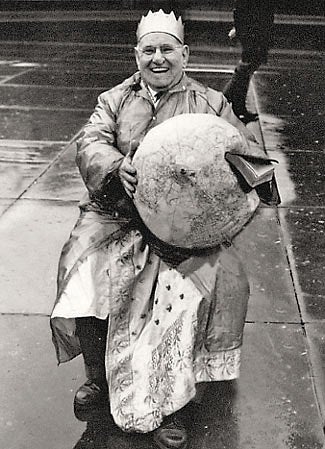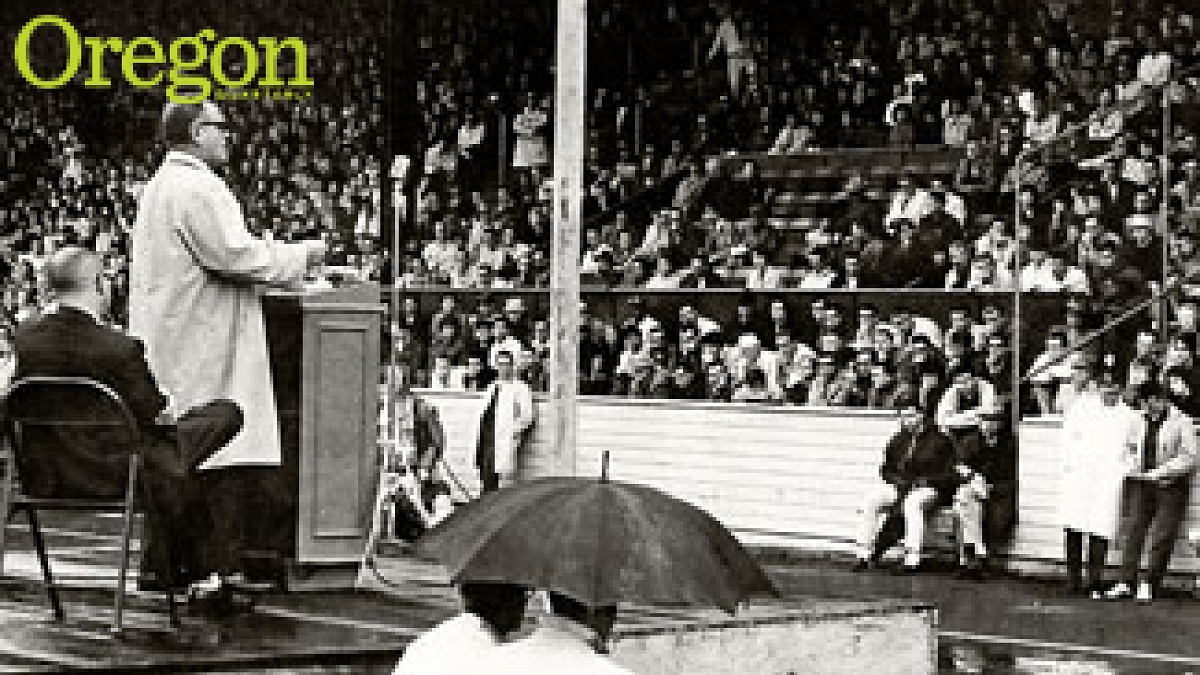On a cool, late October day in 1961, Homer A. Tomlinson arrived in Eugene on a Greyhound bus. He brought with him his portable throne, one gold and one silver crown, a royal robe, and (it was Eugene, after all) an umbrella.

His UO coronation, as outlandish as it seemed, was a seminal teaching moment for the Class of ’62, which celebrated its fiftieth reunion this October. “This was the initial incident that triggered the consciousness of the student body leadership,” says then-ASUO president Dan Williams ’62, who went on to serve as the UO’s vice president of administration from 1983 to 2005. “It was a sobering experience for all of us. I have always carried with me, since then, strongly held views about freedom of speech.”
Tomlinson appeared outside the student union, where about 1,000 students had gathered to watch the show. But things quickly turned ugly. “Before and during the coronation, he was pelted with tomatoes, sprayed with shaving cream, laughed and jeered at, and reviled,” reported the Daily Emerald. “Firecrackers were set off during the ceremony.” Even as a brother in the Delta Upsilon fraternity helped Tomlinson escape in a Chevrolet convertible, students thronged about the car, shouting, “Homer is a fink!” and “Get out of town by sundown!”
Williams had an office just above the plaza. “I saw it unfold, and I was very embarrassed,” he says. “I had a sense of responsibility.” He was not alone. UO president Arthur Flemming called the students’ conduct “indefensible.” Many students wrote letters to the Emerald condemning their classmates’ behavior. One wrote sarcastically, “It takes a lot of guts to degrade a nice harmless old man.”
Even the members of Delta Upsilon, who had brought the would-be king to campus, expressed their remorse. In a letter to the editor, they admitted that they had a “prankish, smug attitude” when they invited him to visit. But once they met Tomlinson, they said, they admired him for his sincerity. “We can say we were successfully taught a lesson in human dignity,” they wrote. “While Brother Homer tried to convey to us his apologies for any repercussions we might encounter for having assisted him to and from the ceremony and for opening our home to him, we feel the lesson we have learned far outweighs any repercussions that might ensue.”
Williams remembers Si Ellingson ’48, director of the Erb Memorial Union, taking the time to talk to student leaders about what had happened. “Si saw this as a learning opportunity for us,” Williams says. “We talked about how the essence of any university is the freedom to say what you want to say, no matter how silly it seems on the surface.”
About four months later, in February 1962, Williams got a call from his counterpart at Reed College saying that student leaders there had invited Gus Hall, chairman of the Communist Party USA, to speak on campus, but they needed another school to share the cost. The Cold War was in full swing, and Hall was a well-known—and generally reviled—figure. The student cabinet sought the president’s approval. “I was naive,” Williams says. “I didn’t think about the potential for serious implications, but I learned about them damn quick, I’ll tell you.”
President Flemming was under a lot of pressure to say no—there were numerous angry phone calls to his office as well as organized protests. TheEmerald wrote of a “smear campaign against Hall and university president Arthur S. Flemming, engineered by local extreme rightists.”
But in Flemming, a liberal easterner, the students found a willing supporter. He consulted with faculty and staff members, who voted unanimously to let Hall speak despite the fact that the presidents of the University of Washington, Western Washington College, Central Washington College, and Oregon State University had refused to allow him on their campuses. “That the state’s public university would invite a Communist to speak was outrageous,” Williams says. “Flemming took a lot of heat, but he made the case publicly for the principles of academic freedom at the UO.”
On the day of Hall’s speech, Williams and his good friend Dick Sorenson ’62, head of the Interfraternity Council, went to pick up Hall at a motel on Franklin Boulevard. “I was nervous by then,” Williams recalls. “People in Oregon had you believing the Devil incarnate was here.” When they arrived at the motel, the door opened a few inches and they saw three or four men inside, dressed in raincoats with fedoras pulled low over their foreheads. “It was like a scene from a B movie,” he says. “Quite intimidating for us young people.”
But Hall turned out to be warm and friendly. He jumped in the car, and accompanied by a police escort, they proceeded to Hayward Field. Here they found nine mounted sheriff’s deputies stationed to the rear of the speaking platform while city and county law enforcement agents kept a close eye on the field and bleachers.
Hall spoke to a capacity crowd of about 11,000, but the speech itself was not very memorable, Williams says. “It revealed him for what he was, not a very great threat to this country. He seemed like an interesting and harmless fellow.”
Hall said in an Emerald interview later that day that his visit to the UO was one of the high points of his life, adding that he was particularly impressed by the maturity and discipline of the crowd. And while his audience didn’t express agreement with his ideas, he said, their polite reception “expressed that they had been hearing about Communism from anti-Communists for so long they wanted to hear about it from the horse’s mouth, so to speak. It shows that they really want to reaffirm the very deep commitment to freedom of speech.”
With these two incidents ingrained in their consciousness, the Class of ’62 presented the university with the Union Square Free Speech Platform just a couple of weeks after Hall’s visit. It was erected in front of the Erb Memorial Union and dedicated by President Flemming. “We gave it as a symbol of what we take for granted at the university,” Williams says. Roger Fischler, MA ’62, PhD ’65, a graduate student in mathematics, was the first to use the venue, immediately after the ceremony. He said in his speech that he felt the university was putting too much emphasis on football, to the neglect of other sports. His comments inspired a discussion among the 100-or-so students in attendance.
A brick replacement for the wooden podium was donated the next year by the Class of ’63. The platform is now located on the north side of the EMU Amphitheater. Anything goes—any argument or position—any time, as long as the speaker is “self-contained” (meaning he or she doesn’t set up a canopy or a table), and is not interrupting a previously scheduled event, says Jessi Steward, MPA ’09, associate director of the EMU.
Most of those who use the platform are students, Steward says, with the majority talking about university or social issues. “But we do get people who have a message that is unpopular or controversial,” she says, citing a visitor who warned students last year that solar flares were about to wipe out the world, and that only those who had gold-flaked blood would be saved.
Some speakers, especially religious extremists who insult their audience, inspire students to call the EMU. “They say, ‘How can you allow this person to be here?’” Steward says. “We tell them that we allow him because we also allow the equal and opposite voice to be heard.”
However uncelebrated the concept of free speech may be by the average student, the free speech platform continues to serve an important role. “A college can’t achieve its mission if there are constraints on topics that are discussed,” Williams says. “Free speech is the essence of a university.”
—By Rosemary Howe Camozzi '96


